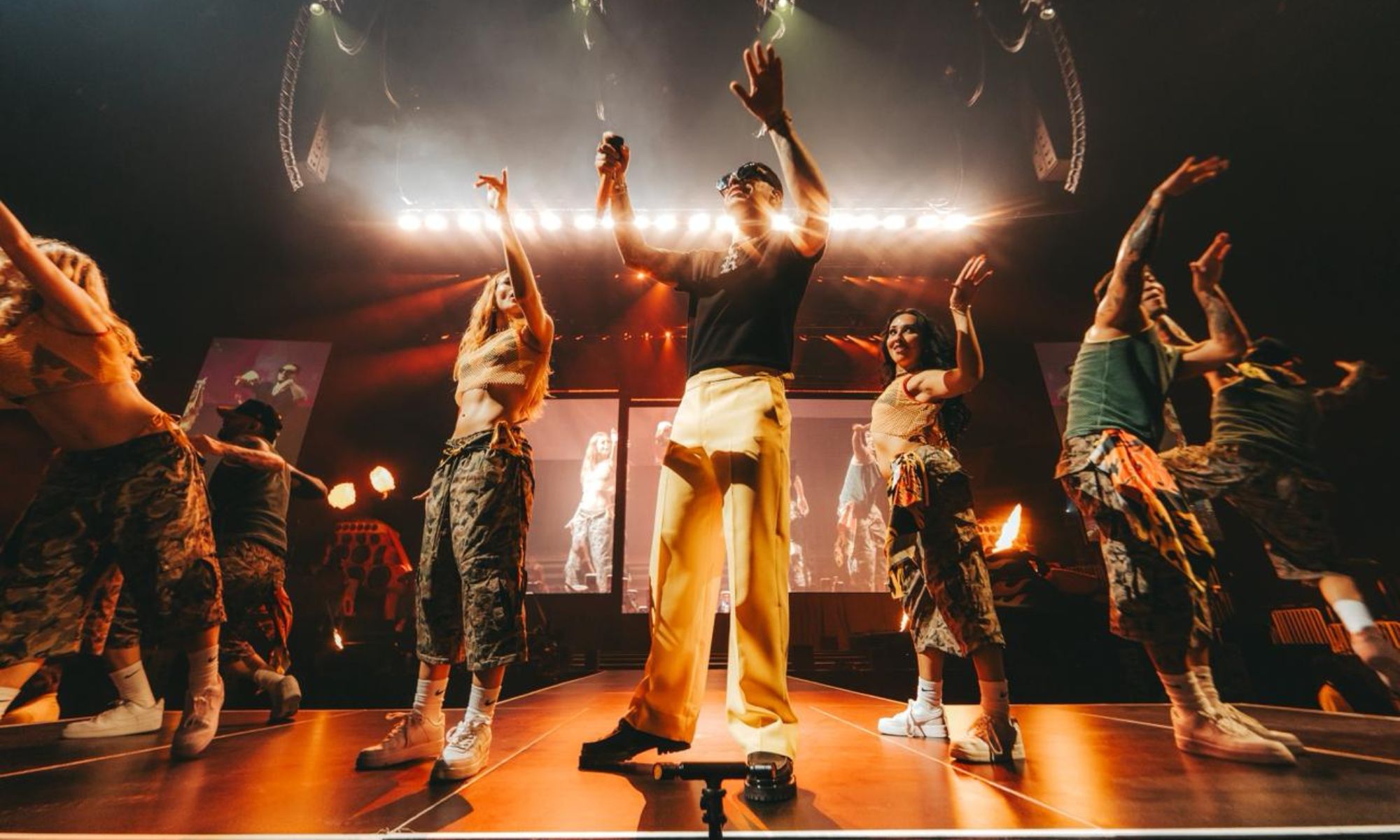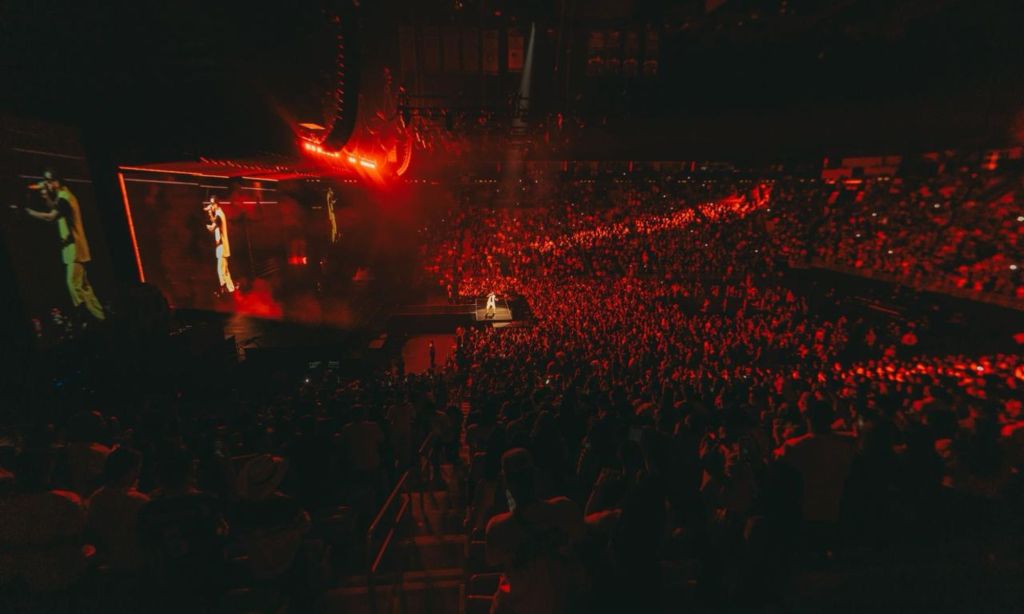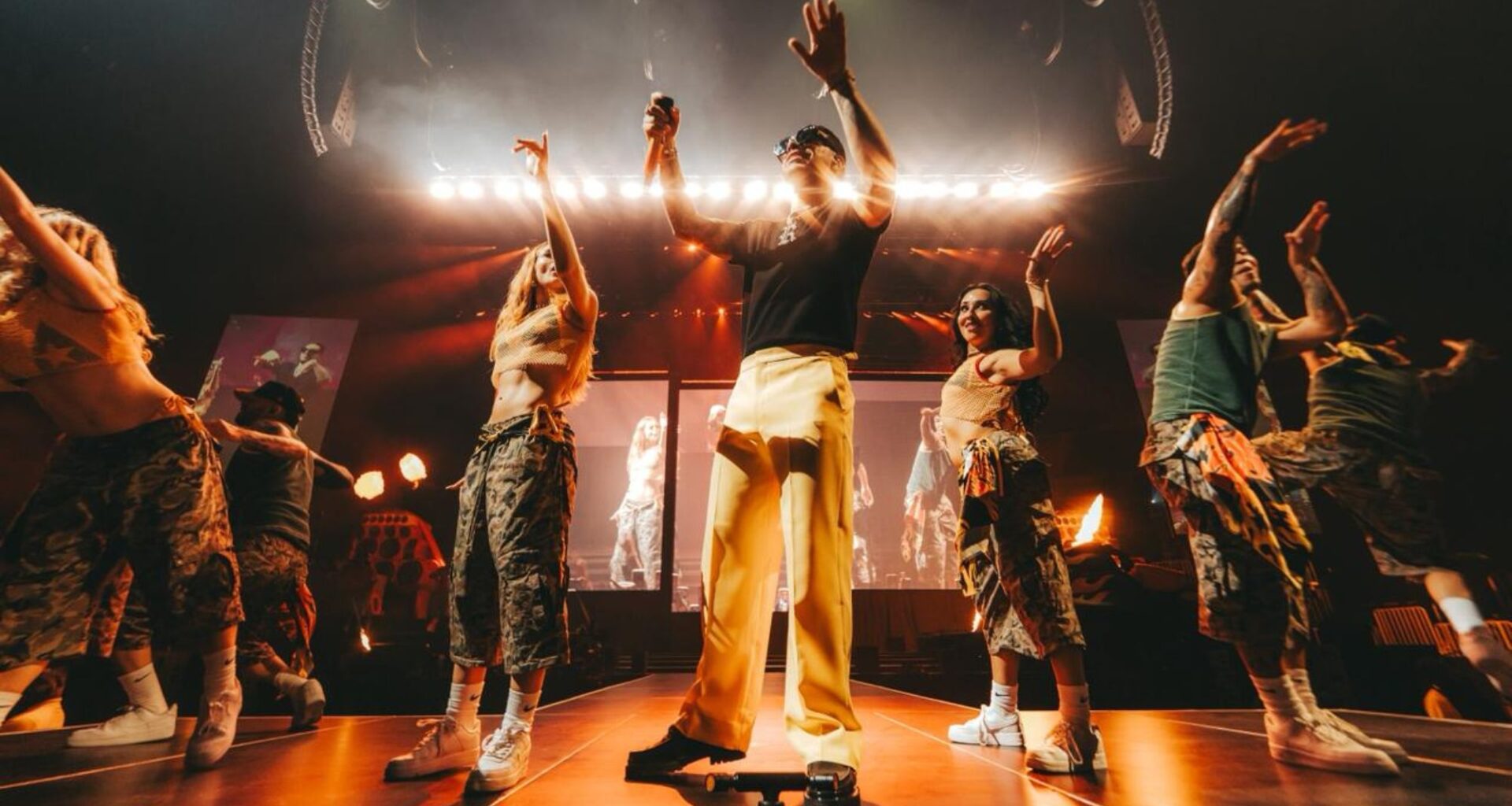
Around 9:30 p.m., the crowd roared as Castro, clad in a simple yellow suit, took to the stage.
Photo by El Skinny
Locals in Miami usually flock to the Kaseya Center in droves to catch a Miami Heat game, but last night, it was Colombian reggaeton superstar Ryan Castro who brought another kind of heat to the arena.
If you think you’re unfamiliar with Castro – you’re actually not. He’s the hitmaker behind songs as big as “Quema” ft. Peso Pluma and “Jordan,” but fresh off his latest album release Sendé, he’s hit the road, with Miami being one of those treasured stops.
Around 9:30 p.m., the crowd roared as Castro, clad in a simple yellow suit, took to the stage, fire blazing both on screens across the front of the arena and in front of his troupe of camouflage-wearing dancers. He naturally opened with the title piece of his new album – his diamond-encrusted necklace with a giant “R” for Ryan shimmering on the singer’s chest – before transitioning to newer hits with an undeniable Caribbean flair, like “Bombastik” and “Sanka.”
As he continued to lead the crowd through a series of hard reggaeton beats, at times beats extremely reminiscent of the genre’s origins in Panamanian dance halls, a look across the venue showed an inflatable jetski on stage with flames for decor, as well as a platform in the middle of the floor with wooden railings and life preservers to look like a pier.
Will you step up to support New Times this year?
We’re aiming to raise $30,000 by December 31, so we can continue covering what matters most to you. If Miami New Times matters to you, please take action and contribute today, so when news happens, our reporters can be there.
When wrapping up the first act of his reggae-inspired set, an animated character appeared on screen as Castro headed off-stage. That character, quite literally a talking flame, wouldn’t be making his last appearance in the show – but in this moment, Castro’s avatar spoke in an indisputably Colombian accent, with an exaggerated Medellin flair.
He showed up several times to transition Castro’s acts, hanging out on the beach in a traditional Colombian sombrero or riding through the streets of Colombia’s “ghettos” – from which Castro says he proudly hails.
 Castro led the crowd through a series of hard reggaeton beats, at times reminiscent of the genre’s origins in Panamanian dance halls.
Castro led the crowd through a series of hard reggaeton beats, at times reminiscent of the genre’s origins in Panamanian dance halls.
In this particular scene, the fiery avatar is on a date, describing the ups and downs of love. A spotlight on stage highlighted the piano player, with Castro finally appearing for his second act. Swapping out his yellow suit for a pristine white one, Castro took a ballad-like spin on “FDSR,” the audience right there with him, belting out heartbreak lyrics.
It wasn’t long before Castro would surprise the crowd with not one, not two, not even three – but four guests (which is almost always a necessity for a Miami audience, as so many of reggaeton’s best songs aren’t solos, but group efforts). Among those guests, Afro-Colombian artist Hamilton – best known for his song “4LIFE” with Castro – with the two sharing plenty of gyrating hip dancing on the center platform.
After Hamilton, Puerto Rican artists Justin Quiles and Lenny Tavarez popped up alongside Castro to sing a number of hits, the two best-known for the work as “The Avengers,” a nickname for the group of reggaeton artists that constantly found themselves on the same body of music.
The night, however, was most devoted to the Colombian community – at one point, the Colombian flag’s colors took over the stage, accompanied by some thorough vallenato dancing to songs like “El Ritmo Que Nos Une” and others highlighting the strong national pride on Castro’s roster.
 Castro wore a Miami Heat jersey on stage.
Castro wore a Miami Heat jersey on stage.
The “Cantante del Ghetto,” as he’s also best-known, came through with a final act dedicated to his humble roots, dating back to his time singing on buses for money in the streets of Medellin. He didn’t do that without a little love for the 305 though, sporting a Miami Heat jersey while vibing out to his mega-hits like “Ghetto Star,” “Quema,” “+57,” and “Jordan” – the latter of which he embraced the basketball image fully and threw out signed basketballs to the crowd (kinda dangerous, now that we think about it, but vibes nonetheless).
He eventually wrapped with songs like “Una Noche en Medellin” and an encore of his “Ba Ba Bad Remix” originally recorded alongside Kybba, Busy Signal, and the man, the myth, the Jamaican legend, Sean Paul. He took off his shirt, showing off his tatted abdomen alongside his dancers, with red confetti and plenty of onstage fireworks adding to the flair of the finale.
In the end, the night was 100% worth the effort in going, as Castro not only showed his dynamism in his music, the Sendé record clearly shining through with his desire to pay tribute to the origins of reggaeton and Curacao inspirations, but he proved humble in simply wanting to share his love of the genre and pride in overcoming his hardships with the audience.
The Kaseya Center may be known for hosting the Heat, but Castro proved he’s part of the pulse that keeps Miami’s rhythm going, bringing the real Latin heat that’s solidifying him as the next reggaeton megastar.

